5 Free AI Tools For Learning & Exploration
Have fun exploring new topics with these interactive sites.
We’re truly spoiled for choice when it comes to AI learning tools.
In principle, any free LLM can become an endlessly patient tutor or an interactive course-maker.
If that’s not enough, tools like NotebookLM’s “Audio Overviews” and ElevenLabs’ GenFM can turn practically any material into a breezy podcast.
But what if you’re looking to explore new topics in a way that’s more interactive than vanilla chatbots and more open-ended than source-grounded NotebookLM?
Well, then you might want to give one of these free-to-try learning tools a go.
1. Albus
I first covered Albus back in June 2023. Centuries ago in AI years.
Since then, Albus introduced lots of useful tools like web search, audio narration, AI image generation, and more.
The basic idea is that you start with a central topic and then use AI to build additional knowledge boxes branching out from it on the fly. These can contain text, visuals, etc. You add new boxes by picking from suggested follow-up questions of freely typing your own.
It’s a cool way to explore topics and sub-topics while retaining the “big picture” view of how they relate to each other.
Albus at a glance
Stand-out features: File upload and analysis, AI image generation, topic-relevant image search, web browsing, audio narration, and choice of multiple LLMs.
Free plan limitations: Just one knowledge board, capped access to advanced models / image generation / audio narration.
Paid plan cost: $9 per month (or $89 if paid annually).
Where to try: albus.org
2. Consensus
Consensus is a bit of a different beast.
While Albus is for free-form learning and exploration, Consensus is for seeking answers to specific questions.
What’s cool is the approach Consensus takes to answering the question: It searches and synthesizes relevant research papers, then gives you a handy summary.
Finally, humanity can put to rest the long-debated question of whether birds can rap:
What’s even cooler is that you can then use AI to “chat” with each individual research paper to get deeper insights:
This helps you extract knowledge nuggets to sound smart in front of your friends without ever reading the paper.
Or, you could, like, actually learn stuff. Whatever.
Consensus at a glance
Stand-out features: Deep-dive research with “Pro Analysis,” robust filtering options, and helpful visual tagging of research papers.
Free plan limitations: Study snapshots, “Ask Paper” chats, bookmarks, and Pro Analyses are capped at 10 per month each.
Paid plan cost: Starts at $11.99 per month ($108 if paid annually).
Where to try: consensus.app
3. Heuristica
In many ways, Heuristica is very similar to Albus: You get a visual canvas for topic exploration with branching sub-boxes.
But Heuristica has a few tricks of its own, many of which seem geared toward students.
First, there are dozens of premade template boxes for identifying pros and cons, getting examples, drawing comparisons, extracting controversial points, and more. You can also create your own boxes with custom instructions.
Second, Heuristica lets you easily pull in information from vetted external sources like arXiv, PubMed, etc.
Finally, you can turn your research into study materials (e.g. flash cards and quizzes) or essay drafts with a click.
So if you need an AI tool for learning at your school or university, Heuristica might just be the way to go.
Heuristica at a glance
Stand-out features: Create quizzes and flashcards, web search, multiple languages, turn research into essays, blog posts, etc.
Free plan limitations: Only basic model, max 3 saved concept maps, many locked features.
Paid plan cost: $6.99 per month ($69.99 if paid annually).
Where to try: www.heuristi.ca
4. Learn About
I mentioned Google’s experimental Learn About tool a month ago. (You might’ve even watched my accompanying chat with
.)Learn About lets you start with a simple query:
In addition to giving you a direct answer, Learn About then automatically populates a left-hand column with related topics for further exploration:
From here, you can keep asking questions, clicking on topics of interest, or requesting either simplified or deeper versions of Learn About’s answers.
You can also upload images, draw on them, and ask questions:
Sadly, Learn About is currently only available in a limited number of countries.
So if you’re a rapping bird enthusiast who lives in Europe like yours truly, you’ll need a VPN to access it.
Learn About at a glance
Stand-out features: Ask questions about uploaded images, on-the-fly chapter creation, “Simplify” vs. “Go Deeper” shortcuts, and topic-relevant image search.
Free plan limitations: None. It’s 100% free.
Paid plan cost: Zero dollars (zero dollars if paid annually).
Where to try: learning.google.com/experiments/learn-about
5. Mapify
Mapify can instantly create a mind map for any topic or query.
Unlike with Albus and Heuristica, you don’t have to add individual boxes one by one. You simply type in your request and watch a complete mind map magically materialize in front of your very eyes.
You can also feed Mapify URLs or files in virtually any format to turn into a mind map.
It’s perfect for when you want to get the gist of a topic quickly before possibly diving in with one of the other tools. You can also request changes and additions to a mind map via a handy AI chat interface.
Mapify at a glance
Stand-out features: Web search, multiple chart types and formats, make changes via chat, summarize any input (PDF, text, website, YouTube, image, or audio).
Free plan limitations: 10 free credits, 100K words to summarize, no PDF, image, or audio summaries. Limited web search. Limited export formats.
Paid plan cost: Start at $9.99 per month ($72 if paid annually).
Where to try: mapify.so
🫵 Over to you…
That’s a (w)rap, folks!
Have you used any of the above tools? Which ones seem the most useful for your needs? What other AI learning tools did I miss in this overview?
Leave a comment or drop me an email at whytryai@substack.com.




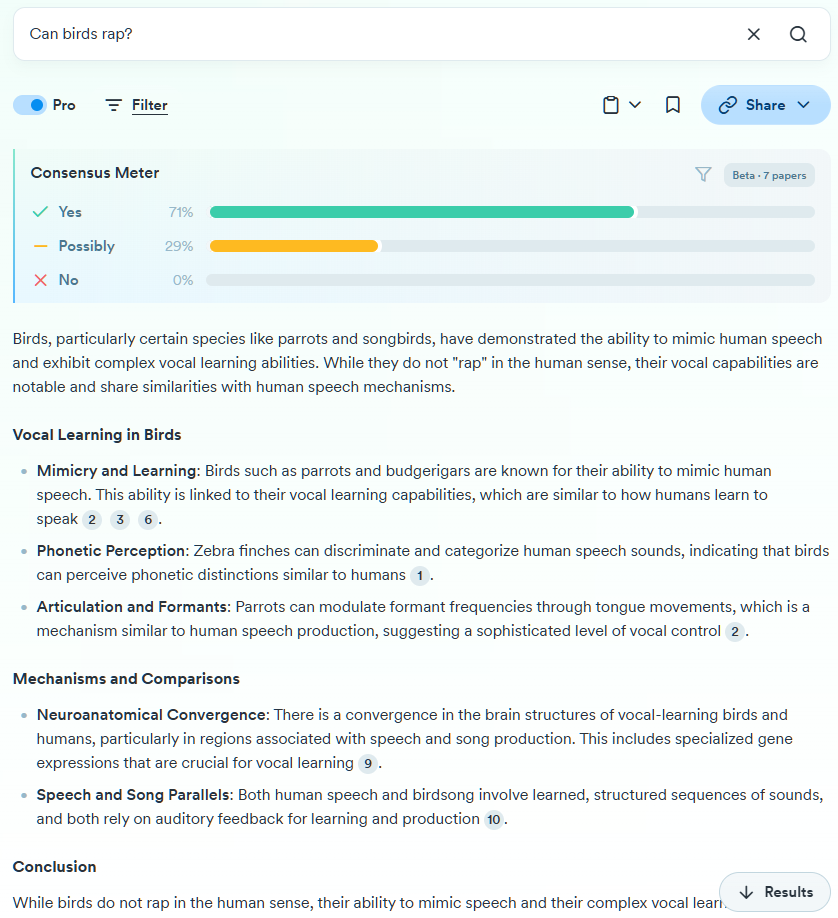
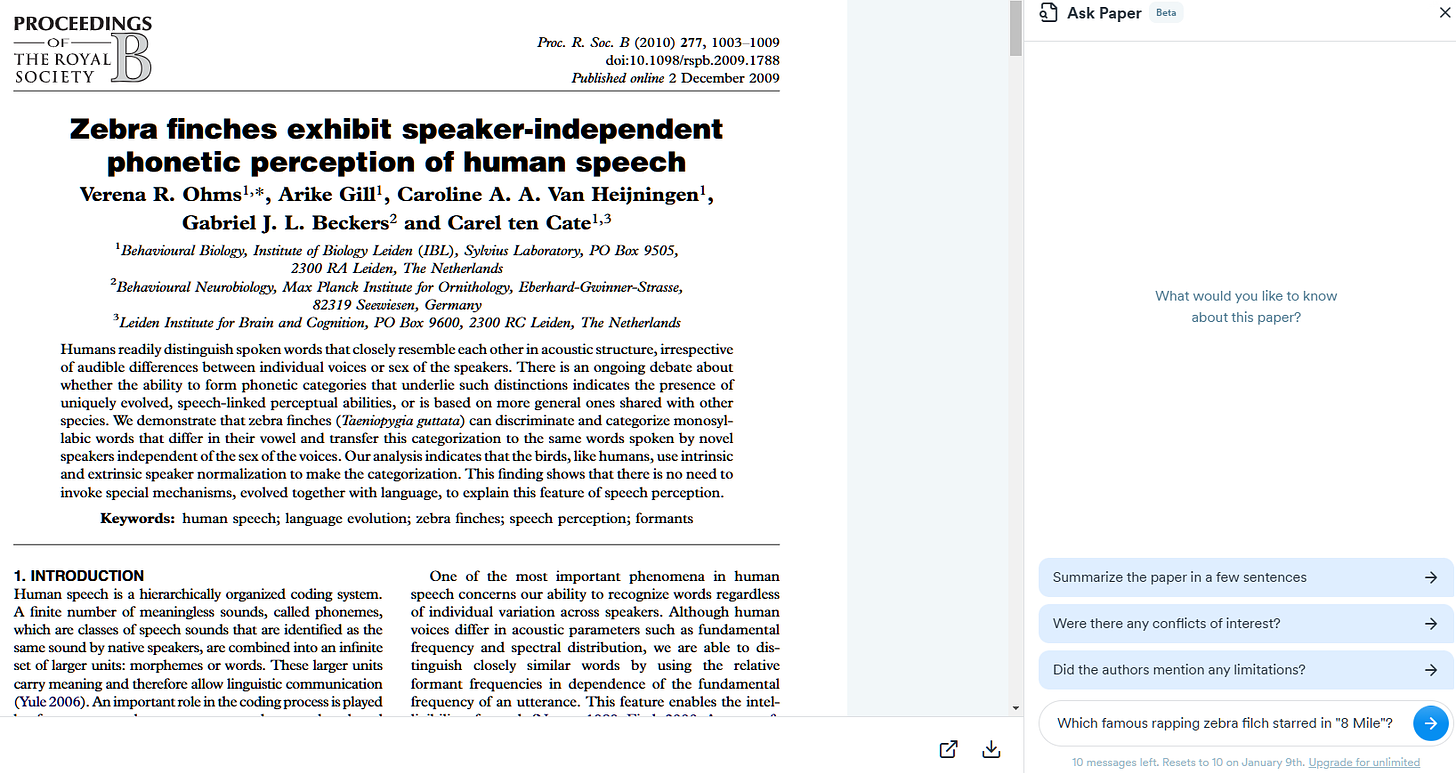
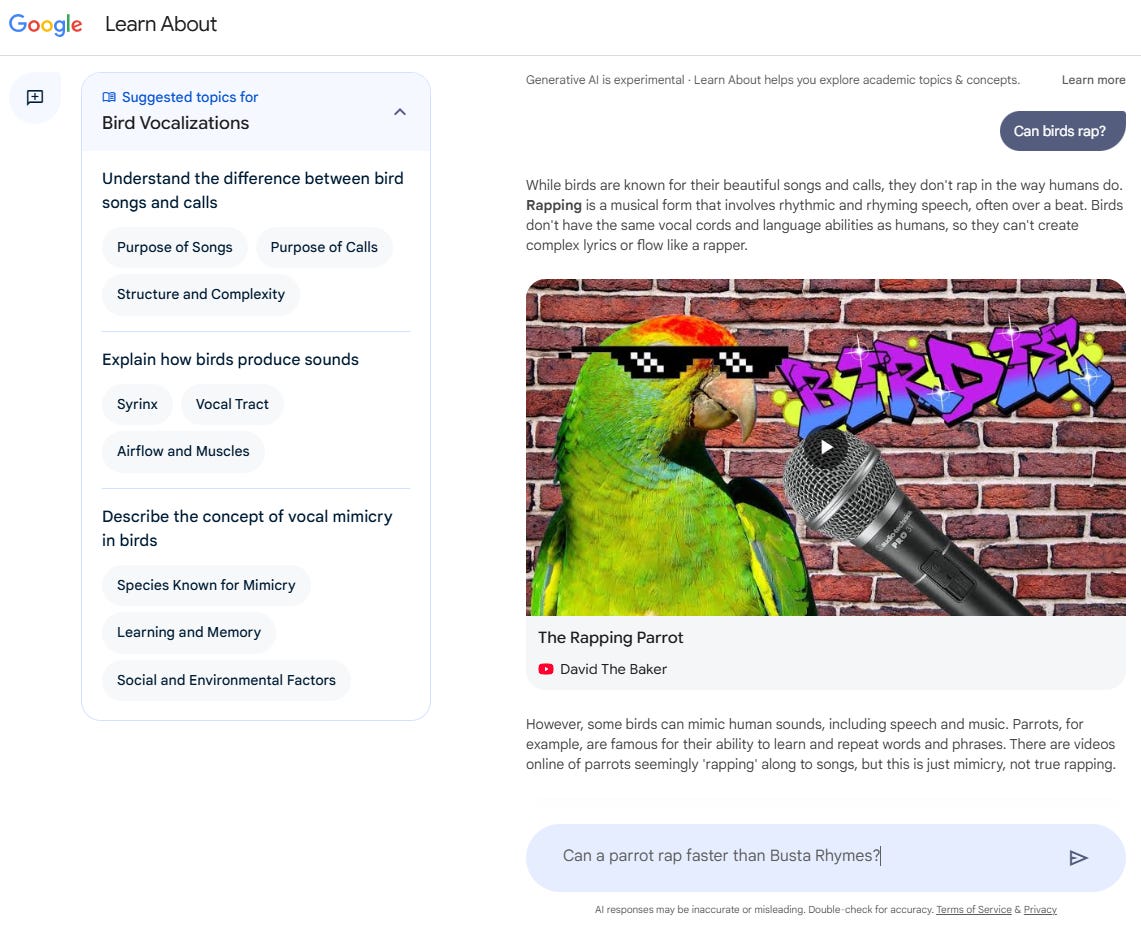

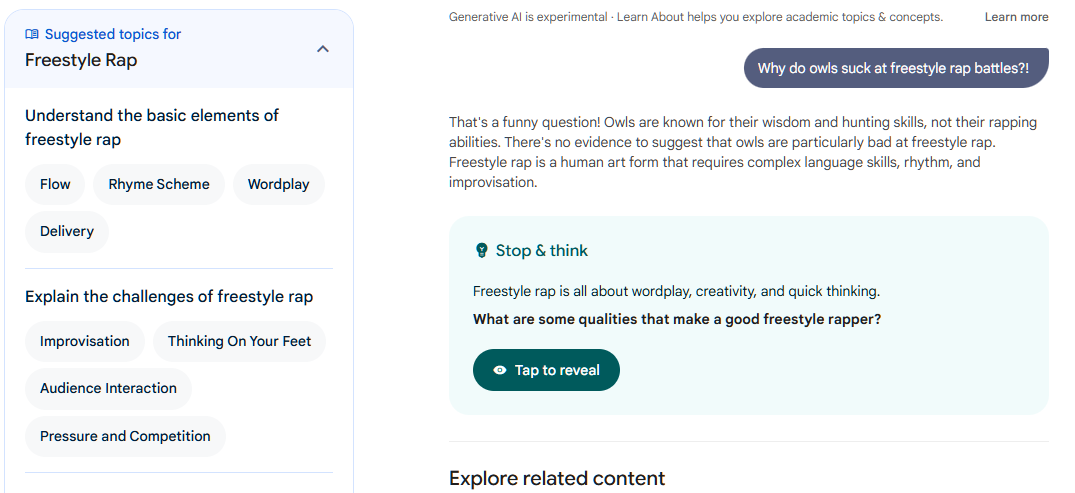
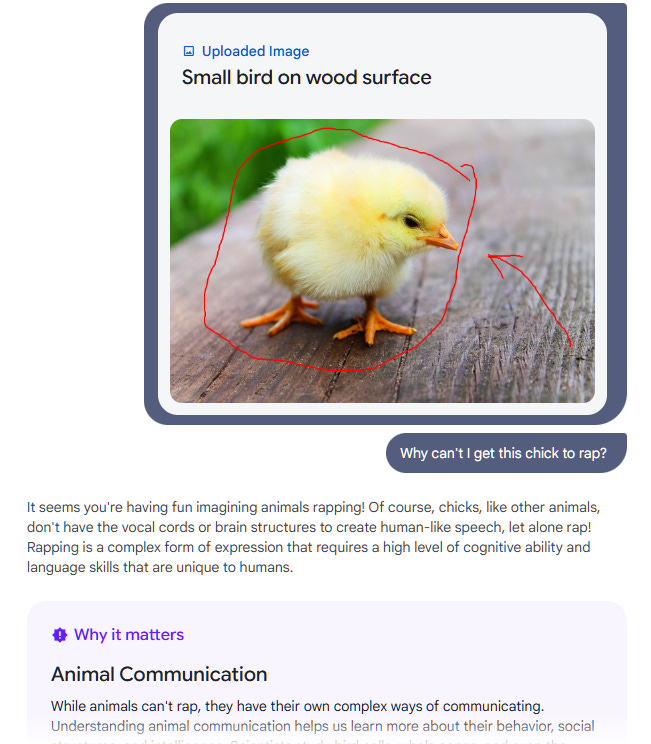
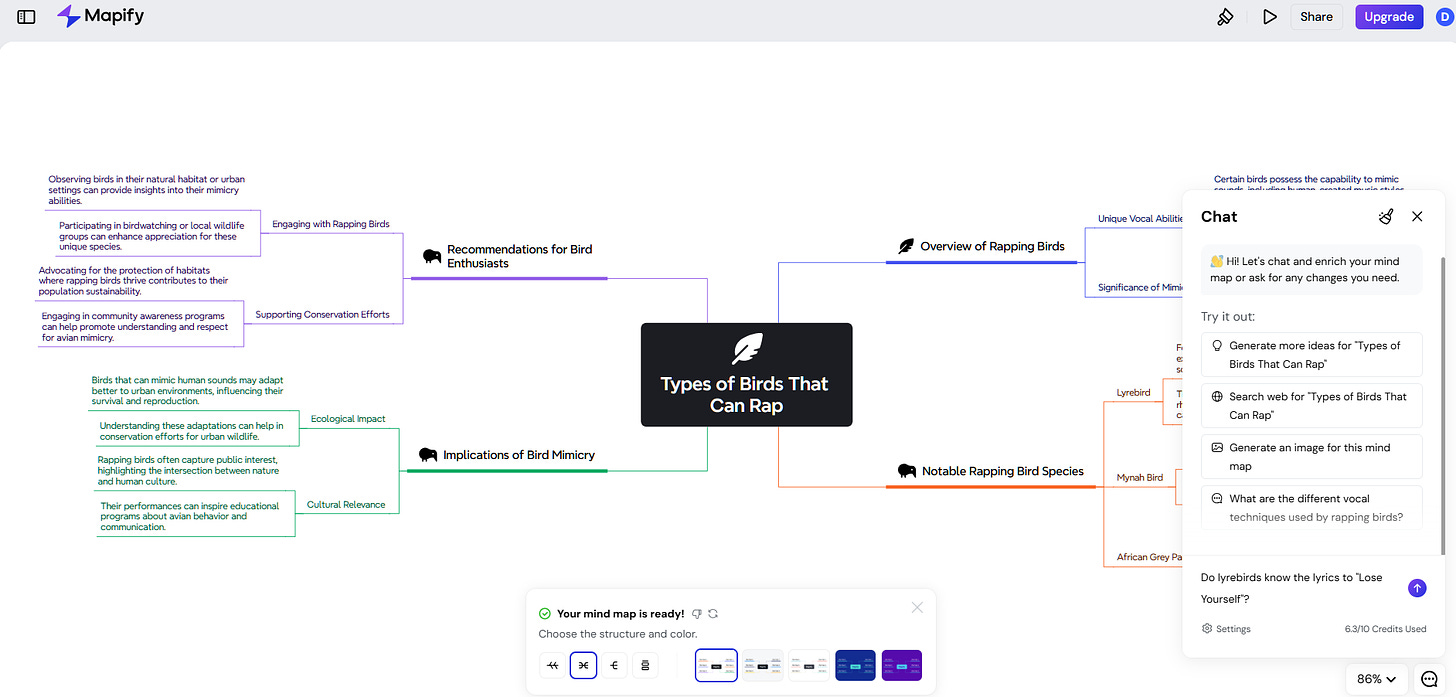
the rapping bird theme for your test questions was hilarious to read.
Dan, do you use any of these on a daily basis? I'm curious about how much of a deep dive they could be vs just having a more stripped down (but quick) LLM for faster type conversations. Are any of them jumping out for the type of stuff you find yourself doing?
For me, it's all about finding a use case. If I can find a good use for a tool and use it every day, I'll get very good at that tool, or at least good at the way I'm using it. I'm not sure if any of these are like necessary for me at the moment, but it's intriguing to think through different frameworks for learning and thinking.
I'm reminded of Perplexity vs the other LLMs I've tried this year. It seems a lot more like Learn About than like, say, Gemini. Interesting to watch these things develop!